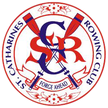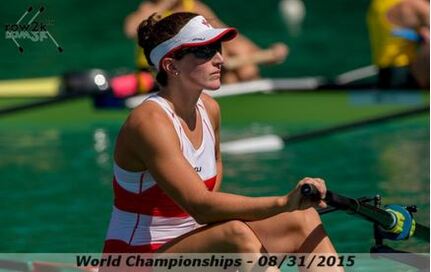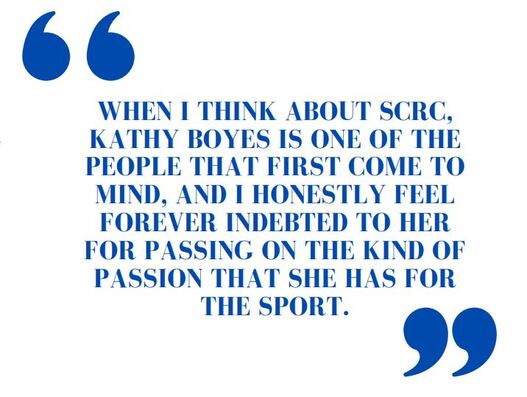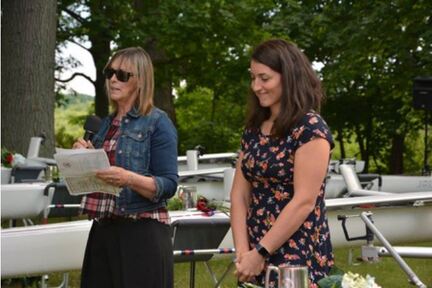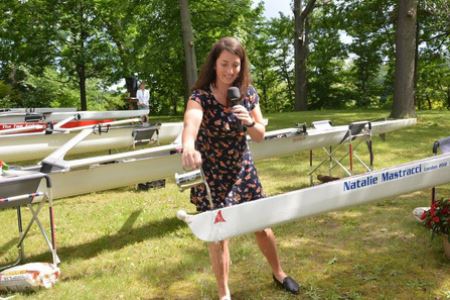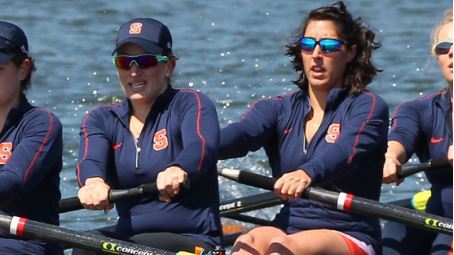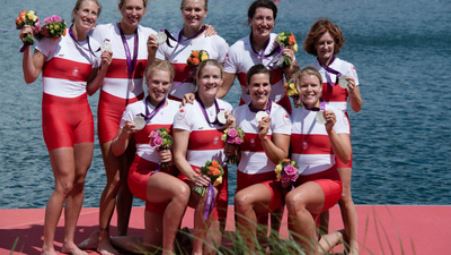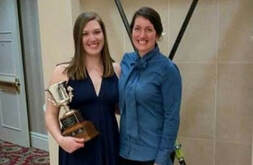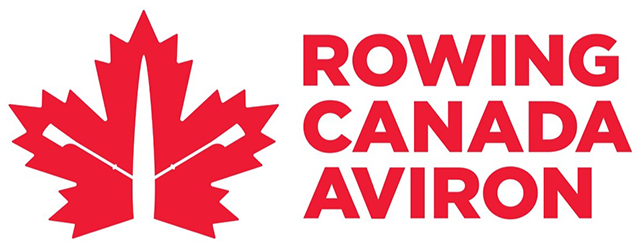Her reputation speaks for itself; having entered into the sport in the year of high school at Denis Morris SS, she quickly made up for any notion of lost time in the numerous international titles she collected, from a 2007 Henley victory in the 8+, to a silver medal in the 8+ at the 2012 Olympics. Her athletic career at Syracuse University is no less decorated, earning an All-American accolade in her senior year. I first met Natalie Mastracci at the 2015 SCRC Captain's Dinner, though I had heard her name long before. Still fresh in my own rowing career, I had looked to emulate members of the Canadian National Team and the tenacity with which they pursued their Olympic goals. Meeting a member of this team, after her acceptance of the Distinguished Alumni Award no less, was quite a memorable event. I sat down with Natalie on December 2nd, in the ordinary fashion of this year, over Zoom, to discuss her extraordinary history in sport. Overall, she was consistent in her appreciation of the beauty of our sport, and remarked on the unique aspects of teamwork and diligence that are required in elite rowing. LK: You began rowing in your final semester of high school, and your life was changed significantly for it, as you accepted an offer to row at Syracuse University shortly thereafter. Why did you initially choose to row at this point in your life, and what convinced you to stay and pursue a scholarship? NM: So many people have asked me this question over the years, and you would think I would have some greater reasoning by now, but it’s still because I thought I wanted a basketball scholarship. I thought I needed to get more athletic and all my friends rowed, and kept saying to me, “just come row with us”. There was always something missing from basketball for me; it’s a team sport, but you don’t really have to be a team. And rowing spoke to me in a way that I had been missing in basketball, just, giving yourself up and turning yourself over to a team to work together and make something happen that’s really great. I still love that; I miss that every day. LK: That’s such a good point about the team aspect, because it’s easy to think of rowing, especially this year, as the erg, or the single, but in reality, the majority of the sport is done in team boats where synchronicity is demanded. You are so dependent on your team. Personally what comes to mind is that we had a practice once (at Notre Dame), about a year ago, we were in an 8+. And we spent the majority of practice working on the roll-up. and that was all we did that practice, just a plethora of square up drills, because it was so essential to our process, regardless of how minute it may seem, only a half second of work, but it is a team sport, and it matters. NM: That’s funny that you bring that up because one of the most indelible moments over my career was when we were preparing for 2012 (Olympics), and my coach had us do that same thing, of working on the square up. And it is only a half second, but you can feel it when it’s off. At some point, you begin to feel things behind you, in front of that you can’t see, if you tune into it. And that’s another part of the beauty of this sport, you tune into another person. LK: Absolutely, it might seem impossible to sync up to someone so precisely, but the more time you spend in a boat, especially with those same people, the easier it is to do just that. With that being said, I'd like to return to the point in your life when you signed a full scholarship to row at Syracuse months into your novice year. What did you do to prepare for the transition to NCAA rowing; did your high school coach prepare you for it, and if they did, how so? NM: I feel like I was gently guided into the sport. There are so many people at SCRC that love rowing to their core, that it is just impossible to go to that place and not feel the love. Everyone is just so wonderful, but I can't not talk about Kathy Boyes. She was absolutely instrumental in passing on that love to, scores of women. Did Kathy ever coach you?
LK: How has rowing shaped your life, during competition and now in life after rowing? Furthermore, what did your daily life look like when you were training on the National Team? NM: As a person, I definitely grew, having that opportunity to train with the national team. I came into it as a sensitive person, and I still am, but I took things very deeply, and you just can’t do that when you’re getting feedback constantly; it’ll tear you apart. I guess at the beginning, I was taking things in too personally, and the experience taught me to be stronger. You have take the objective things that are being said, and then reposition them in the mind. You need to learn to say to yourself, 'someone is giving me feedback because they want me to improve! They think I can, so I should take that feedback and try to be better'. To try and have that more objective position, and I’ve taken that into other areas of my life as well. To separate myself from the feedback is a little superpower, so I’m thankful that I had that opportunity. LK: Could you talk a bit about being a woman in sport? NM: It is interesting to be a woman in sport, because as women, we can feel societal pressures to look, act and behave a certain way, and rowing really gave me the freedom to concentrate on a certain level of excellence without having to care about that. It was refreshing, my body had a function, and that was to be strong. If it wasn’t about being efficient, or strong, or fast, then, it didn’t matter to me. In this life, now, I don’t get that kind of pass, you’re in society’s little box now. So, it’s very interesting to be a woman in sport, to be free of that for a moment. You just get to be excellent. LK: I never thought of it that way. One of my best friends is not an athlete is 5’2" and I tower over her; and then when I go to rowing clinics, or events of some kind, I look like I'm 5’2". And I think that just goes to show how subjective body image can be, especially for athletes. NM: That’s another thing too; only being compared to other women in the sport is something else. It’s a beautiful meritocracy, that in rowing, everyone is pretty much the same, to be plain, and it’s very interesting that speed and determination is the dividing factor. It’s a very interesting little microcosm to be a part of, even though, that should probably change. LK: In regards to competitions, I would be remiss if I didn't ask you about your experiences at the 2012 and 2016 Olympics, in which you won a silver medal at the former. Could you speak a bit about your experience there? NM: It was really interesting, the first time I went to the Olympics, because it wasn’t anything that I thought it would be. It was really, just a race. There were people I would normally see there, I had my team, there was the course. And as rowers, we have to be near the lake, so we were kind of away from the Olympic village because of travel, so you don’t really feel like you're at The Olympics. And in rowing, we have the beautiful luxury of being in the first week, so you get to compete, and then you cross the finish line and are like, “I’m at the Olympics!” And then you get to go do all this fun stuff, and meet a whole bunch of people. So it was a really beautiful experience. LK: I’m sure that mind set really helped you, instead of having added internal pressure and anxieties of being at the Olympics, because when stripped to the barest of examinations, it really is just a race. Did you typically have a pre race routine, or a pattern of emotions? Personally, I’m super nervous until I get on the water. I’m a ball of nerves for the run, the meeting, the dynamic stretching, and then when I get on the water, it’s all fine. Did you have anything like that? NM: Our warmup took six hours. They were set up to prepare the body and the mind. So, you don’t really have time to get nervous, or think of other things, which is great. You just get on your little train car, and you pass all the stations, and then suddenly you’re in your seat, and then it gets to the race, and you just have to do what you always do. LK: Would you have any advice for athletes in preparing for a race? Is there something that you did before a competition that helped you get in the zone? NM: I think it was different every time. But I always try to listen to music and really hear the lyrics. Then I would journal my thoughts the night before. And at the time, journaling feels like a waste of time, but looking back now, it’s such a great keepsake from that time in my life. As silly as it may feel, do journal things. LK: I'd like to close up this conversation with parting advice you might have for athletes at different stages in their competitive career. What would you say to kids who are interested in rowing, but have never done it before? NM: Just try it. If you’re interested in it, just try it. The least you can do is make some friends, and the most you can do is find a different way to believe in yourself. LK: What advice do you have for high school rowers who want to pursue post-secondary rowing? NM: Be very choosy about where you go. Think about what you want to get out rowing and try to find those likeminded people. Make sure that you meet the team, you sit down with the coach and that you really feel excited about going to that school. L to R - Mastracci at the 2018 SCRC Boat Christening; Mastracci (left) at Syracuse University; at the 2012 London Olympic Games with her silver medal crew, second from back right. LK: Advice for athletes who want to go to the Olympics? NM: Don’t try to go to the Olympics. If you try to go to the Olympics, it’s probably not going to work. But, if you keep trying to be a better version of yourself, there is no ceiling as to what you can do. Do just make a blanket goal of going to the Olympics, because you don’t actually know what it entails. Just keep trying to be a better version of yourself, and keep trying and see where you end up
|
St. Catharines Rowing ClubThe St. Catharines Rowing Club has a long tradition of competing at the highest level in the sport of rowing. Categories
All
Archives
November 2023
|
Please Support Our Sponsors
SIGNATURE
PLATINUM
GOLD
SILVER
BRONZE
© 2014, St. Catharines Rowing Club
St. Catharines Rowing Club, P.O. Box 28010, 600 Ontario St., St. Catharines, ON, L2N 7P8.
St. Catharines Rowing Club, P.O. Box 28010, 600 Ontario St., St. Catharines, ON, L2N 7P8.
